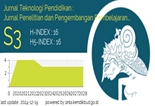Application Grouping Skills : Learning Methods to Support Student Talent Interest Based on Experiential Learning
Abstract
Keywords
Full Text:
PDFReferences
Algor, J. (2019). Penerapan Data Mining Penentu Minat Dan Bakat Siswa Smk Dengan Metode C4 . 5. Jurnal ALGOR, 1(1), 28–37.
Alokafani, Y., Muhsam, J., & Arifin. (2022). Penerapan Model Pembelajaran Experiential Learning Untuk Meningkatkan Hasil Belajar Peserta Didik Kelas V SD Muhammadiyah 1 Kota Kupang. Jurnal Pendidikan Dasar Flobamorata, 3(2), 308–313.
Anggraini, I. A., Utami, W. D., Rahma, S. B., & Tangerang, U. M. (2020). Analisis Minat dan Bakat Peserta didik terhadap Pembelajaran. Terampil : Jurnal Pendidikan Dan Pembelajaran Dasar, 7(1), 23–28.
Barida, M. (2018). Model Experiential Learning dalam Pembelajaran untuk Meningkatkan Keaktifan Bertanya Mahasiswa. Jurnal Fokus Konseling, 4(2), 153–161.
Djunaidi. (2021). Isu-Isu Mutakhir dalam Pelayanan Di Bidang Pendidikan. Wahasa Didaktika, 19(3), 304–319.
Fitrah, M., & Ruslan. (2019). Eksplorasi Sistem Pelaksanaan Evaluasi Pembelajaran di Sekolah pada Masa Pandemi Covid-19 di Bima. Jurnal Basicedu, 5(1), 178–187.
Francis, B., Archer, L., Hodgen, J., Pepper, D., Taylor, B., & Travers, M. C. (2017). Exploring The Relative Lack of Impact of Research On ‘ Ability Grouping ’ in England : A Discourse Analytic Account. Cambridge Journal of Education, 47(1), 1–17. https://doi.org/10.1080/0305764X.2015.1093095
Green-Weir, R. R., Anderson, D., & Carpenter, R. (2021). Impact of Instructional Practices on Soft-Skill Competencies. Research in Higher Education Journal, 40(3), 15–31. http://www.aabri.com/copyright.html
Immaniar, B. D., Astina, I. K., & Sumarmi. (2019). Pembelajaran Lingkungan Berbasis Kearifan Lokal dengan Model Experiential Learning. Jurnal Pendidikan : Teori, Penelitian, Dan Pengembangan, 4(5), 648–653.
Kadi, T., & Awwaliyah, R. (2017). Inovasi Pendidikan : Upaya Penyelesaian Problematika Pendidikan di Indonesia. Jurnal Islam Nusantara, 01(02), 144–155.
Lubna. (2017). Isu-Isu Pendidikan di Indonesia: Inovasi Kurikulum dan Peningkatan Profesionalitas Guru. Society, Jurnal Jurusan Pendidikan IPS Ekonomi, xii(10), 23–35.
Morris, T. . (2019). Experiential Learning – A Systematic Review and Revision of Kolb’s Model’, Interactive Learning Environments. Interactive Learning Environments, 5(3), 421–440. https://doi.org/10.1080/10494820.2019.1570279
Priyandari, T. Y., Astina, I. K., & Utomo, D. H. (2020). Pengaruh Model Pembelajaran Experiential Learning terhadap Kemampuan Pemecahan Masalah Mahasiswa Geografi. Jurnal Pendidikan : Teori, Penelitian, Dan Pengembangan, 5(1), 15–20.
Rozi, B. (2019). Problematika Pendidikan Islam di Era Revolusi Industri 4.0. Jurnal Pendidikan Islam, 09(1), 33–47.
Silviani, E., Mardiani, D., & Sofyan, D. (2021). Analisis Kemampuan Representasi Matematis Siswa SMP pada Materi Statistika. Mosharafa: Jurnal Pendidikan Matematika, 10(September), 483–492.
Sitanggang, N., & Saragih, A. H. (2017). Studi Karakteristik Siswa SLTA di Kota Medan. Jurnal Teknologi Pendidikan, 6(2), 185–196.
Staker, H., Arnett, T., Powell, A., & Innovation, C. C. I. for D. (2020). Developing a Student-Centered Workforce through Micro-Credentials. In Clayton Christensen Institute for Disruptive Innovation (Issue September). Christensen Institute. https://acces.bibl.ulaval.ca/login?url=https://search.ebscohost.com/login.aspx?direct=true&db=eric&AN=ED610709&%0Alang=fr&site=ehost-live
Tan, C. Y., Abdullah, A. G. K., & Ali, A. J. (2021). Soft Skill Integration for Inspiring Critical Employability Skills in Private Higher Education. Eurasian Journal of Educational Research, 2021(92), 23–40. https://doi.org/10.14689/ejer.2021.92.2
Webel, C., Woldruff, J., Lindaman, L., Daugherty, K., & Brown, J. (2021). Field-Based Perspectives on Enacting Alternatives to Ability Grouping in Elementary Mathematics Instruction. Mathematics Teacher Education and Development, 23(3), 111–131.
Zamroni, Rofiki, M., Rozi, F., Muali, C., K, I. H., Majid, T., Abdullah, D., Hasan, K., Nasrah, S., Rahman, M., & Ita, C. (2021). E-Leadership in Education in Improving Teacher Competence in Industrial Revolution 4 . 0. Turkish Online Journal of Qualitative Inquiry (TOJQI), 12(4), 1650–1654.
DOI: https://doi.org/10.33394/jtp.v8i2.6570
Refbacks
- There are currently no refbacks.
Copyright (c) 2023 Fathor Rozi, Muhammad Munif, Andi' Noer Mu'ti Sulaiman

This work is licensed under a Creative Commons Attribution-ShareAlike 4.0 International License.
This Journal has been Indexed by:
Jurnal Teknologi Pendidikan
ISSN: 2656-1417 (Online)
ISSN: 2503-0620 (Print)
Published by Program Studi Teknologi Pendidikan, FIPP
Universitas Pendidikan Mandalika
Email: [email protected]

This work is licensed under a Creative Commons Attribution-ShareAlike 4.0 International License.















.png)







